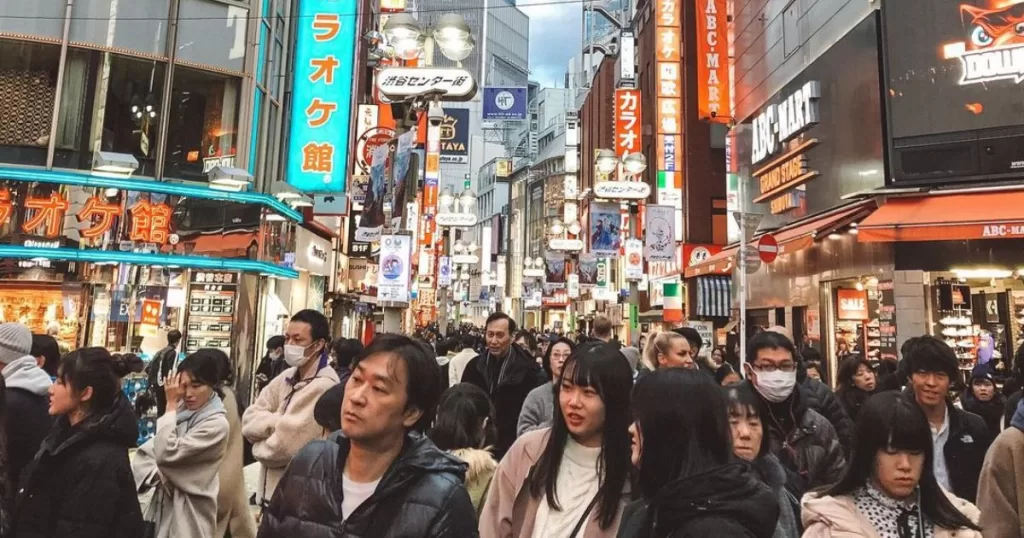4 Reasons Japan is the Ultimate Destination for Burnt-Out Americans
In recent years, there has been a growing trend of individuals, particularly from Western countries, who aspire to move to Japan without any concrete job prospects, family connections, or social ties.
This phenomenon raises the question: what makes Japan so appealing to these aspiring expats?

Soft Power and Cultural Influence
Japan’s allure can be attributed to its impressive soft power and cultural influence. Through the export of anime, manga, video games, music, and food, Japan has successfully popularized its culture on a global scale.
This has led to a generation of young people who have grown up exposed to and fascinated by Japanese culture, creating a strong desire to experience it firsthand.
According to a Reddit user, “Japan has projected and exported their culture through Anime, videogames, food, as well as music throughout the 80’s and beyond; not to mention the tech sector (Sony, Toyota, Nintendo, etc). Without using military might, Japanese culture was popularized.” This sentiment is echoed by many who believe that Japan’s soft power has played a significant role in attracting aspiring expats.
Perceived Quality of Life
Another factor that draws people to Japan is the perceived quality of life. Japan is often portrayed as a safe, clean, and efficient country with a strong sense of community and respect for others.
The country’s low crime rates, reliable public transportation, and 24/7 convenience stores are just a few of the aspects that appeal to those seeking a change from their current lifestyles.
Reddit user notes, “Japanese, in particular, value the cultural freedom where they can simply be themselves, without the immense pressure to conform societal norms in Japan. As a foreigner moving to Japan, we’re not expected to conform and as such don’t really experience it, so to us it’s a wonderful experience, similar to the experience Japanese may have when they come to the U.S.”
Escaping the Rat Race
For some, the desire to move to Japan stems from a need to escape the “rat race” and high-pressure lifestyles in their home countries. Japan’s work culture, while notorious for its long hours, is also known for its stability and job security.
Additionally, the country’s emphasis on work-life balance, with generous vacation time and national holidays, is appealing to those seeking a more balanced lifestyle.
A Reddit user, shares their experience: “As an American who just moved to Japan and has traveled to other countries, people tell me all the time that they wish they could move to the US. And I see that sentiment all over social media as well. A lot of people thought I was crazy for leaving the US, but I think they’re a bit crazy for wanting to move there so badly 🤷♀️”
The Grass is Always Greener
Despite the allure of Japan, it’s important to recognize that the grass isn’t always greener on the other side. Many aspiring expats may have a romanticized view of Japan based on their limited exposure to the country’s culture and media.
The reality of living in Japan can be quite different, with challenges such as the language barrier, cultural differences, and the high cost of living in cities like Tokyo.
Reddit user, a permanent resident of Japan, cautions, “Younger people now still seem to have aspirations of moving to the US/Australia/Singapore. I suspect Westerners have similar feelings about South Korea, China, Thailand, Italy, NZ, Australia and maybe a few other places. Many of those aspirations are also filled with shit and dreams.”
User Comments
- “Reasons my sis gave when she moved to Japan: clean, food is safe/low chance of consuming gutter oil, it’s cheaper to eat out than cook, pay probably ain’t great but she works remote for a US company her and her husband are clearing like 200-300k usd a year, good (?) Schools, no guns, no school shootings, low crime, safe to walk alone at night, convenience stores have good food, “the US is the sh*ttiest country in the world”, trains/public transport, driving test is easy if you have a US license, 140yen to 1usd right now, animeeeee, “Texas is a goddamn scam, why do I have to pay for health insurance?”, universal healthcare, people are polite to a point of fake ess, lifelong gaijin pass, gets to brag that she lives in Tokyo to all the relatives and ex friends she hates, and I’m sure a whole bunch of other stuff.”
- “I am one of those people. This is my last day of a three week stay, am from the states and I don’t want to go back there. I am going to move Japan because it just feels good to be, “free”. I have worked in logistics for seven years and am going to apply to logistic companies here l, I know Spanish and English, but not Japanese but I will learn. It’s a society that just functions in a non-toxic type of way.”
- “If you travel to Tokyo and pay attention you’ll notice most of the people there seem genuinely depressed and miserable. If I saw somebody smiling it would actually stand out to me. On the subway, 99% of people are either lost in their phone looking like a zombie or asleep like a zombie. Everyone is in a hurry. But there is also a beauty to it, the place is very clean and everyone is very respectful. It it’s a lonely place.”
The desire to move to Japan is a complex and multi-faceted phenomenon, driven by a combination of cultural influence, perceived quality of life, and a need for change. While Japan certainly has its appeal, it’s essential for aspiring expats to approach the decision with a realistic understanding of the challenges and differences they may face.
Ultimately, the decision to move to Japan, or any country for that matter, is a deeply personal one that requires careful consideration and planning.